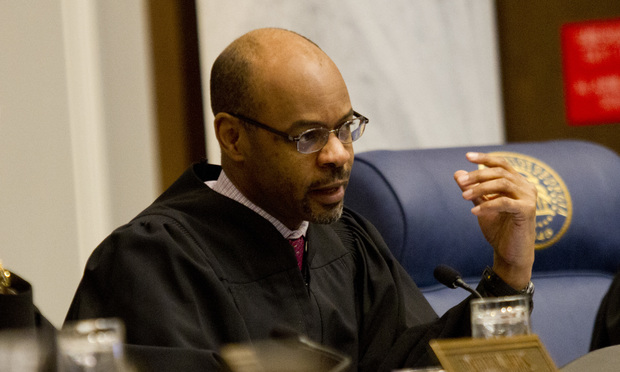Shackling a Defendant Leads to Murder Conviction Reversal
"Shackling is an inherently prejudicial practice that undermines the presumption of innocence in the eyes of the jury, hampers the defendant's ability to participate in his own defense, and impacts the overall dignity of the judicial process," Chief Justice Harold Melton said.
May 04, 2020 at 10:09 PM
5 minute read
 Chief Justice Harold Melton, Supreme Court of Georgia. (Photo: John Disney/ALM)
Chief Justice Harold Melton, Supreme Court of Georgia. (Photo: John Disney/ALM)
The Georgia Supreme Court reversed a murder conviction Monday because the judge required the defendant to be shackled during the trial.
"It is well established that 'no person should be tried while shackled . . . except as a last resort,'" Chief Justice Harold Melton wrote for a unanimous court. "The law has long forbidden routine use of visible shackles during the guilt phase; it permits a State to shackle a criminal defendant only in the presence of a special need." Melton cited the U.S. Supreme Court's opinion from Illinois v. Allen in 1970.
"Shackling is an inherently prejudicial practice that undermines the presumption of innocence in the eyes of the jury, hampers the defendant's ability to participate in his own defense, and impacts the overall dignity of the judicial process," Melton said.
The opinion reverses the 2016 conviction of Esco Hill for malice murder. Hill represented himself at trial.
"I'm just glad I could help him finish this up," the winning lawyer, Christina Marie Cribbs of the Georgia Public Defender Council appellate division, told the Daily Report in a phone call Monday. "I just helped him bring it home."
Cribbs said the successful appeal was only possible because Hill made the proper objections to being forced to appear in front of the jury wearing shackles on his arms and legs during the six-day trial in Chattooga County Superior Court before Judge Kristina Cook Graham, daughter of famed criminal defense lawyer Bobby Lee Cook.
Co-defendant Hjalmar Rodriquez made the same objection—although Rodriquez dropped out in the middle of the trial after pleading guilty. They were both incarcerated at Hayes State Prison and accused of killing another inmate, Alford Morris, in 2011. "Morris had a reputation for attacking Muslim inmates and stealing their possessions," Melton said. A group of Muslim inmates attacked Morris after he attacked Rodriquez. Rodriquez sought help from Hill, who was respected as a leader of the Muslim prisioners.
Cribbs said a witness testified to seeing Rodriquez stab Morris. But the only testimony against Hill was that he tripped Morris when Morris tried to run away. And that testimony was from a guard Hill impeached on cross examination with an earlier conflicting statement saying it wasn't clear who tripped Morris.
On the day Morris was killed, Hill had already been in prison for 20 years serving a life sentence for armed robbery, though he wasn't yet 40, Cribbs said.
Five years later, Hill was on trial for murder before Graham. In answer to the question of why the defendants couldn't wear stun belts instead of shackles, the judge said and Melton quoted: "I'm going to stay with the restraints we have. We've had several hearings in this case. When you gentlemen were arraigned you were under a lot more physical constraints than you are now. The Court was going to allow you to remain without your hands under shackles but just feet shackles until we had problems with Mr. Hill and we have security issues. Security is a very serious issue here, this is a very old courthouse. We have marvelous human resources but very poor physical resources. So I rely upon my security decisions."
Hill asked another question: "One more thing. Your Honor, can you state for the record what the security issues were with Hill that required restraints because …"
But the judge interrupted: "I said all I'm going to say about it, Mr. Hill."
Cribbs said that by the time she got the case in 2017, Hill had been held in solitary confinement at the Georgia Diagnostic and Classification Prison in Jackson—home of the state's death row—for nearly seven years.
She found it remarkable that he was even able to carry on a conversation. Yet they talked for three and a half hours. And he was able to identify the U.S. Supreme Court precedent in Illinois v. Allen that ultimately won his appeal.
"That case was 50 years ago," Cribbs said. "Hopefully this will be a good, clear message that we should not be doing that, and that this really renders a trial unconstitutional."
Her opponents were Lookout Mountain Circuit District Attorney Herbert "Buzz" Franklin and Assistant DA Christopher Arnt, who tried the case and handled the oral argument for the appeal. Neither Franklin nor Arnt responded to a request for comment Monday.
"Hill contends that the trial court abused its discretion when it failed to make the necessary factual findings to justify its security decision; allow Hill the opportunity to challenge that decision by calling witnesses or holding a hearing; and consider alternative security measures, especially in light of his pro se status. He further argues that the trial court's decision prejudiced his right to a fair trial," Melton said. "We agree."
The case is Hill v. State, No. S20A0285.
This content has been archived. It is available through our partners, LexisNexis® and Bloomberg Law.
To view this content, please continue to their sites.
Not a Lexis Subscriber?
Subscribe Now
Not a Bloomberg Law Subscriber?
Subscribe Now
NOT FOR REPRINT
© 2025 ALM Global, LLC, All Rights Reserved. Request academic re-use from www.copyright.com. All other uses, submit a request to [email protected]. For more information visit Asset & Logo Licensing.
You Might Like
View All
Panel to Decide if Governor Should Suspend Georgia Lawyer From Elected Post
4 minute read
Big Tech Is Cozying Up to President Trump. Here's Why Their Lawyers Are Cautiously Optimistic

Trending Stories
- 1In Novel Oil and Gas Feud, 5th Circuit Gives Choice of Arbitration Venue
- 2Jury Seated in Glynn County Trial of Ex-Prosecutor Accused of Shielding Ahmaud Arbery's Killers
- 3Ex-Archegos CFO Gets 8-Year Prison Sentence for Fraud Scheme
- 4Judges Split Over Whether Indigent Prisoners Bringing Suit Must Each Pay Filing Fee
- 5Law Firms Report Wide Growth, Successful Billing Rate Increases and Less Merger Interest
Who Got The Work
J. Brugh Lower of Gibbons has entered an appearance for industrial equipment supplier Devco Corporation in a pending trademark infringement lawsuit. The suit, accusing the defendant of selling knock-off Graco products, was filed Dec. 18 in New Jersey District Court by Rivkin Radler on behalf of Graco Inc. and Graco Minnesota. The case, assigned to U.S. District Judge Zahid N. Quraishi, is 3:24-cv-11294, Graco Inc. et al v. Devco Corporation.
Who Got The Work
Rebecca Maller-Stein and Kent A. Yalowitz of Arnold & Porter Kaye Scholer have entered their appearances for Hanaco Venture Capital and its executives, Lior Prosor and David Frankel, in a pending securities lawsuit. The action, filed on Dec. 24 in New York Southern District Court by Zell, Aron & Co. on behalf of Goldeneye Advisors, accuses the defendants of negligently and fraudulently managing the plaintiff's $1 million investment. The case, assigned to U.S. District Judge Vernon S. Broderick, is 1:24-cv-09918, Goldeneye Advisors, LLC v. Hanaco Venture Capital, Ltd. et al.
Who Got The Work
Attorneys from A&O Shearman has stepped in as defense counsel for Toronto-Dominion Bank and other defendants in a pending securities class action. The suit, filed Dec. 11 in New York Southern District Court by Bleichmar Fonti & Auld, accuses the defendants of concealing the bank's 'pervasive' deficiencies in regards to its compliance with the Bank Secrecy Act and the quality of its anti-money laundering controls. The case, assigned to U.S. District Judge Arun Subramanian, is 1:24-cv-09445, Gonzalez v. The Toronto-Dominion Bank et al.
Who Got The Work
Crown Castle International, a Pennsylvania company providing shared communications infrastructure, has turned to Luke D. Wolf of Gordon Rees Scully Mansukhani to fend off a pending breach-of-contract lawsuit. The court action, filed Nov. 25 in Michigan Eastern District Court by Hooper Hathaway PC on behalf of The Town Residences LLC, accuses Crown Castle of failing to transfer approximately $30,000 in utility payments from T-Mobile in breach of a roof-top lease and assignment agreement. The case, assigned to U.S. District Judge Susan K. Declercq, is 2:24-cv-13131, The Town Residences LLC v. T-Mobile US, Inc. et al.
Who Got The Work
Wilfred P. Coronato and Daniel M. Schwartz of McCarter & English have stepped in as defense counsel to Electrolux Home Products Inc. in a pending product liability lawsuit. The court action, filed Nov. 26 in New York Eastern District Court by Poulos Lopiccolo PC and Nagel Rice LLP on behalf of David Stern, alleges that the defendant's refrigerators’ drawers and shelving repeatedly break and fall apart within months after purchase. The case, assigned to U.S. District Judge Joan M. Azrack, is 2:24-cv-08204, Stern v. Electrolux Home Products, Inc.
Featured Firms
Law Offices of Gary Martin Hays & Associates, P.C.
(470) 294-1674
Law Offices of Mark E. Salomone
(857) 444-6468
Smith & Hassler
(713) 739-1250







